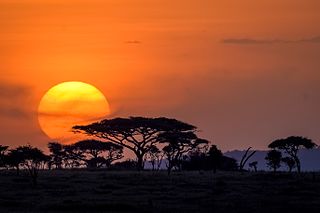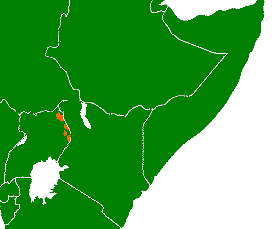External links
| Official languages | |||||||||||||||||||||||||||||||||
|---|---|---|---|---|---|---|---|---|---|---|---|---|---|---|---|---|---|---|---|---|---|---|---|---|---|---|---|---|---|---|---|---|---|
| Indigenous languages |
| ||||||||||||||||||||||||||||||||
| | This language-related article is a stub. You can help Wikipedia by expanding it. |
| Omaio | |
|---|---|
| Kakesio–Makao Dorobo | |
| Region | Tanzania |
Native speakers | 3 (2018) [1] |
| Language codes | |
| ISO 639-3 | None (mis) |
| Glottolog | kake1234 |
Omaio (Omaiyo) is an obscure Dorobo language of Tanzania. According to interviews with speakers, the people were expelled from the Serengeti in the 1950s to make way for the park. As of 2018, three speakers remember some words of the language, though it had not been spoken since they were children. Based on the few hundred words and phrases that have been collected, the language has not been classified. There is evidence of words that can be traced to contact with speakers of the Maa and Datooga languages, as well as older words from the Southern Nilotic family which may have been inherited or borrowed.

Armenian is an Indo-European language and the sole member of an independent branch of that language family. It is the native language of the Armenian people and the official language of Armenia. Historically spoken in the Armenian highlands, today Armenian is widely spoken throughout the Armenian diaspora. Armenian is written in its own writing system, the Armenian alphabet, introduced in 405 AD by the canonized saint Mesrop Mashtots. The estimated number of Armenian speakers worldwide is between five and seven million.

Japanese is the principal language of the Japonic language family spoken by the Japanese people. It has around 128 million speakers, primarily in Japan, the only country where it is the national language, and within the Japanese diaspora worldwide.

The Serengeti ecosystem is a geographical region in Africa, spanning the Mara and Arusha Regions of Tanzania. The protected area within the region includes approximately 30,000 km2 (12,000 sq mi) of land, including the Serengeti National Park and several game reserves. The Serengeti hosts the second largest terrestrial mammal migration in the world, which helps secure it as one of the Seven Natural Wonders of Africa.

Urdu is an Indo-Aryan language spoken chiefly in South Asia. It is the national language and lingua franca of Pakistan, where it is also an official language alongside English. In India, Urdu is an Eighth Schedule language whose status and cultural heritage is recognised by the Constitution of India; and the Deoband school played a key role in establishing Urdu as the language of Indian Muslims, and it also has an official status in several Indian states. In Nepal, Urdu is a registered regional dialect and in South Africa it is a protected language in the constitution. It is also spoken as a minority language in Afghanistan and Bangladesh, with no official status.

Modern Hebrew, also called Israeli Hebrew or simply Hebrew, is the standard form of the Hebrew language spoken today. Developed as part of Hebrew's revival in the late 19th century and early 20th century, it is the official language of the State of Israel. It is the world's only Canaanite language that is still in use.
The Eastern Nilotic languages are one of the three primary branches of the Nilotic languages, themselves belonging to the Eastern Sudanic subfamily of Nilo-Saharan; they are believed to have begun to diverge about 3,000 years ago, and have spread southwards from an original home in Equatoria in South Sudan. They are spoken across a large area in East Africa, ranging from Equatoria to the highlands of Tanzania. Their speakers are mostly cattle herders living in semi-arid or arid plains.
Dorobo is a derogatory umbrella term for several unrelated hunter-gatherer groups of Kenya and Tanzania. They comprised client groups to the Maasai and did not practice cattle pastoralism.
The Southern Nilotic languages are spoken mainly in western Kenya and northern Tanzania. They form a division of the larger Nilotic language family, along with the Western Nilotic languages and the Eastern Nilotic languages.

The Kuliak languages, also called the Rub languages, are a group of languages spoken by small relict communities in the mountainous Karamoja region of northeastern Uganda.
The Yaaku are a people who are said to have lived in regions of southern Ethiopia and central Kenya, possibly through to the 18th century. The language they spoke is today called Yaakunte. The Yaaku assimilated a hunter-gathering population, whom they called Mukogodo, when they first settled in their place of origin and the Mukogodo adopted the Yaakunte language. However, the Yaaku were later assimilated by a food producing population and they lost their way of life. The Yaakunte language was kept alive for sometime by the Mukogodo who maintained their own hunter-gathering way of life, but they were later immersed in Maasai culture and adopted the Maa language and way of life. The Yaakunte language is today facing extinction but is undergoing a revival movement. In the present time, the terms Yaaku and Mukogodo, are used to refer to a population living in Mukogodo forest west of Mount Kenya.
The Akie are a Tanzanian ethnic and linguistic people living in south western Simanjiro District of Manyara Region. In 2000 the Akie population was counted at 5,268. The Akie, like other hunter-gatherer peoples in Kenya and Tanzania, are sometimes called by the derogatory and misleading term Dorobo or Wandorobo. The Akie were featured by Bruce Parry in the BBC series "Tribe". They live around 150 miles south east of Olduvai Gorge

English is a West Germanic language in the Indo-European language family, whose speakers, called Anglophones, originated in early medieval England. The namesake of the language is the Angles, one of the ancient Germanic peoples that migrated to the island of Great Britain. Modern English is both the most spoken language in the world and the third-most spoken native language, after Mandarin Chinese and Spanish. It is also the most widely learned second language in the world, with more second-language speakers than native speakers.
Duke is an Oceanic language now spoken by about 3,000 people on Kolombangara island, Solomon Islands. Duke is an exonymic name. Endonymic names are Dughore (Ndughore) and Kolei. Dughore is also a name for an area in southwest Kolombangara, Kolei is the general bilateral address term specific to Nduke. A more recent alternative name is 'Kolombangara'.

Irish, or Gaelic, also sometimes known outside Ireland as Irish Gaelic, is a Goidelic language of the Insular Celtic branch of the Celtic language family, which is a part of the Indo-European language family. Irish is indigenous to the island of Ireland and was the population's first language until the 19th century, when English gradually became dominant, particularly in the last decades of the century. Today, Irish is still commonly spoken as a first language in areas of Ireland collectively known as the Gaeltacht, in which only 2% of Ireland's population lived in 2016. It is also spoken by a larger group of habitual but non-traditional speakers, mostly in urban areas where the majority are second-language speakers. From 2006–08, over 22,000 Irish Americans reported speaking Irish as their first language at home, with several times that number claiming "some knowledge" of the language.

Nihali, also known as Nahali or erroneously as Kalto, is an endangered language isolate that is spoken in west-central India, with approximately 2,000 people in 1991 out of an ethnic population of 5,000. The Nihali tribal area is just south of the Tapti River, around the village of Tembi in Burhanpur district of Madhya Pradesh. Speakers of the Nihali language are also present in several villages of the Buldhana district in Maharashtra such as Jamod, Sonbardi, Kuvardev, Chalthana, Ambavara, Wasali, and Cicari. There are dialectal differences between the Kuvardev-Chalthana and the Jamod-Sonbardi varieties.
Ik is one of the Kuliak languages of northeastern Uganda. The Kuliak languages form their own branch of the proposed Nilo-Saharan language family. With the other two Kuliak languages being moribund, Ik may soon be the sole remaining language of its family.
Ndorobo or Dorobo may refer to:

The Dolgan language is a Turkic language with around 1,000 speakers, spoken in the Taymyr Peninsula in Russia. The speakers are known as the Dolgans. The word "Dolgan" means 'tribe living on the middle reaches of the river'. This is most likely signifying the geographical location of the Dolgan tribe. Its closest relative is Sakha.
Serengeti-Dorobo is an obscure "Dorobo" language, a few words of which were recorded in the late 19th century by Oscar Baumann. From the little data available, the language is not obviously related to any other, though the numeral system is Nilotic. It is not the only "Dorobo" language formerly spoken in the Serengeti.
The Degere are a Mijikenda-speaking group of former hunter-gatherers of Kenya and Tanzania, now settled along the Ramisi, Mwena and Umba rivers, with a few along the coast. They may number no more than a few hundred to at most a few thousand. They are believed to be related to, possibly descended from, the Oromo-speaking Waata. They are variously reported to speak Duruma, Digo, a similar Mijikenda dialect of their own, or to speak Mijikenda with grammatical errors much as the Waata do when they speak Mijikenda.